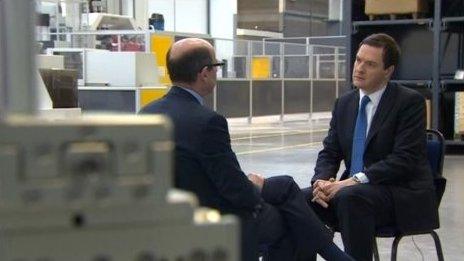Pay the poor more - George Osborne
- Published
Chancellor George Osborne: "We have worked hard to get to this point and we can start to enjoy the fruits of all that hard work"
It is the clearest sign of changing political times and of the potency of the cost of living debate.
George Osborne has just told me that that he wants to see an above-inflation increase in the minimum wage - something the Tories once opposed as a job destroyer.
The chancellor has written to the Low Pay Commission, which will make a decision in the next few weeks about how far to raise the hourly rate from its current level of £6.31. You can read the news story here.
Mr Osborne told me that to restore the minimum wage to where it once stood in real terms it would need to go up to £7 an hour by next year. The minimum wage is now only worth in real terms (in other words after taking inflation into account) around what it was in 2004.
The decision about what figure to set and how quickly to raise it is not one taken by politicians. This is designed to ensure that in the run up to the election they don't compete to promise pay rises to the more than 1.3 million people on the minimum wages, which may prove unaffordable to the businesses which actually foot the bill.
Although the rate has not kept pace with inflation in recent years it has increased relative to average earnings which, as is well known, have fallen significantly in real terms in this age of austerity. There is a full explanation here.
Lower benefit bills
Ever since the Labour Party and TUC joined forces to campaign for an above inflation rise the chancellor has come under pressure from Conservative MPs to match their call. Those close to Mr Osborne hope it will demonstrate that the Tories are not ignoring the plight of the working poor.

This will not please the chancellor's coalition partners. The Liberal Democrat Business Secretary Vince Cable has responsibility for the Low Pay Commission. He wrote to them last September to ask them to consider what economic circumstances would allow them to increase the minimum wage significantly. Some Lib Dems have accused the Tories of stealing their policy ideas in order to look more like "the friends of the poor".
The Treasury have investigated the claim - often made on the left - that a rise in the minimum wage is a "win win" - ie it would not just make the poor richer, but the country as well.
The chancellor insists that the gains made by lower benefit bills and a higher tax take are wiped out by the cost of lower business profits, lower corporation tax receipts and higher pensions which are linked to earnings.
Living standards
I put it to George Osborne that many would think he was simply trying to claim credit for a policy his party had long fought and that his insistence that "we were all in it together" was undermined by the targeting of the next round of spending cuts on benefits often paid to the same people who are on the minimum wage.
Here is the exchange:
NICK ROBINSON: If you cut £12bn in working benefits, you're cutting from the working poor?
GEORGE OSBORNE: "The working poor are the people who suffer most when the public finances get out of control, when the economy collapses. when the banking system isn't properly regulated. Our government, the government I am part of, has got on top of these problems.
"And the whole country benefits and I want to make sure the working poor benefit as part of it. I want to make sure we are all in this together as part of the recovery. Which is why I want to see those above inflation increases in the minimum wage, precisely because the British economy can now afford that."
Interestingly the chancellor has stopped claiming that living standards are rising. He used to deploy a measure of household disposable income which his own creation - the Office for Budget Responsibility - and the independent Institute of Fiscal Studies said were misleading.
When I asked him whether he accepted that people would be poorer at the next election than they had been at the last he answered that the country was poorer because - you guessed it - Labour made it poorer.